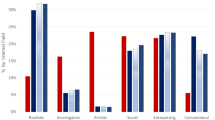Abstract
If the principle of equal pay for work of equal value is valid, then the practice of paying workers in third-world countries at a lower rate than workers doing the same jobs in industrialized nations is unjust. Recently Henry Shue argued that the principle is not valid. In this paper I criticize Shue's arguments and offer additional arguments in support of his conclusion.
Similar content being viewed by others

Reference
Shue, Henry, 1984, ‘Transnational Transgressions’, New Introductory Essays in Business Ethics, ed., Tom Regan, Random House, New York, p. 274 ff.
Author information
Authors and Affiliations
Additional information
Hugh Lehman is a Professor of Philosophy at the University of Guelph. His most important publications are Introduction to the Philosophy of Mathematics, Basil Blackwell, 1979, ‘Mathematical Proofs, Gaps and Postulationism’, The Monist 67, and ‘Intuitionism and Platonism on Infinite Totalities’, Idealistic Studies XIII. He also edited a special issue of Animal Regulation Studies 2 that contained papers from the conference: ‘Ethical Issues Concerning the Use of Animals in Agriculture and Scientific Research’.
Rights and permissions
About this article
Cite this article
Lehman, H. Equal pay for equal work in the third world. J Bus Ethics 4, 487–491 (1985). https://doi.org/10.1007/BF00382611
Issue Date:
DOI: https://doi.org/10.1007/BF00382611



